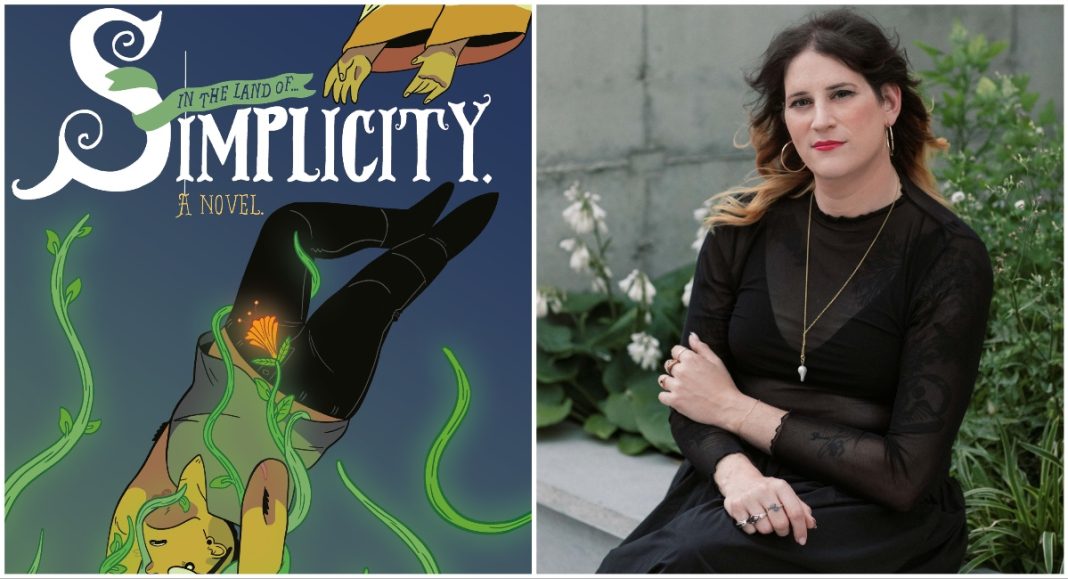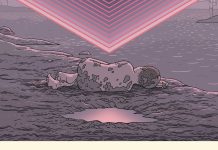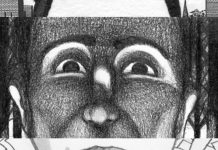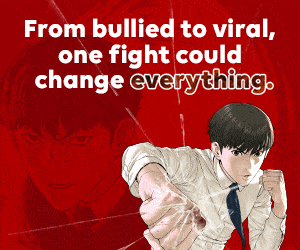Penguin Random House imprint Pantheon has announced the next graphic novel from Ignatz winner and Herblock Prize finalist Mattie Lubchansky. Simplicity: A Novel arrives where books and comics are sold on July 29, 2025!
Known for her work in political cartooning as the Associate Editor of Ignatz award-winning magazine and website The Nib (thenib.com) and critically acclaimed graphic novel Boys Weekend, Lubchansky’s comics often address social and political issues with a sharp wit and distinctive style. Simplicity is no exception, taking place “in the near-ish future, where America has collapsed into semi-fascist, highly surveilled, walled city-states with a lot of ungoverned wilderness in between.”
The Beat caught up with Lubchansky over email to discuss what readers can expect from her latest long-form work Simplicity, the research process involved in making the book, and why its important to have trans culture, created by and for trans people.
OLLIE KAPLAN: How would you describe Simplicity to someone?
MATTIE LUBCHANSKY: It takes place in the near-ish future, where America has collapsed into semi-fascist, highly surveilled, walled city-states with a lot of ungoverned wilderness in between. A timid, kind of prudish scholar sets off into the Catskill Mountains to study a cult that’s been in a settlement there since the 1970s called “Simplicity.” Things get weird.
KAPLAN: What did you learn from creating Boys Weekend? How did you apply that knowledge to creating Simplicity?
LUBCHANSKY: I can’t remember who said it, but I remember hearing a prose novelist talking about how every book they’d ever done, they had to re-learn how to write a book because they were learning how to write that book. Boys Weekend was the longest work I’d ever done – I’d had a lot of minicomics and a novella (The Antifa Super-Soldier Cookbook) under my belt but it was a real learn-by-doing experience, and I think the biggest thing I took away was that I had this huge, expansive space to play around in, and I really tried to stretch my legs a little more in Simplicity, not just from a story and character standpoint, but visually too.
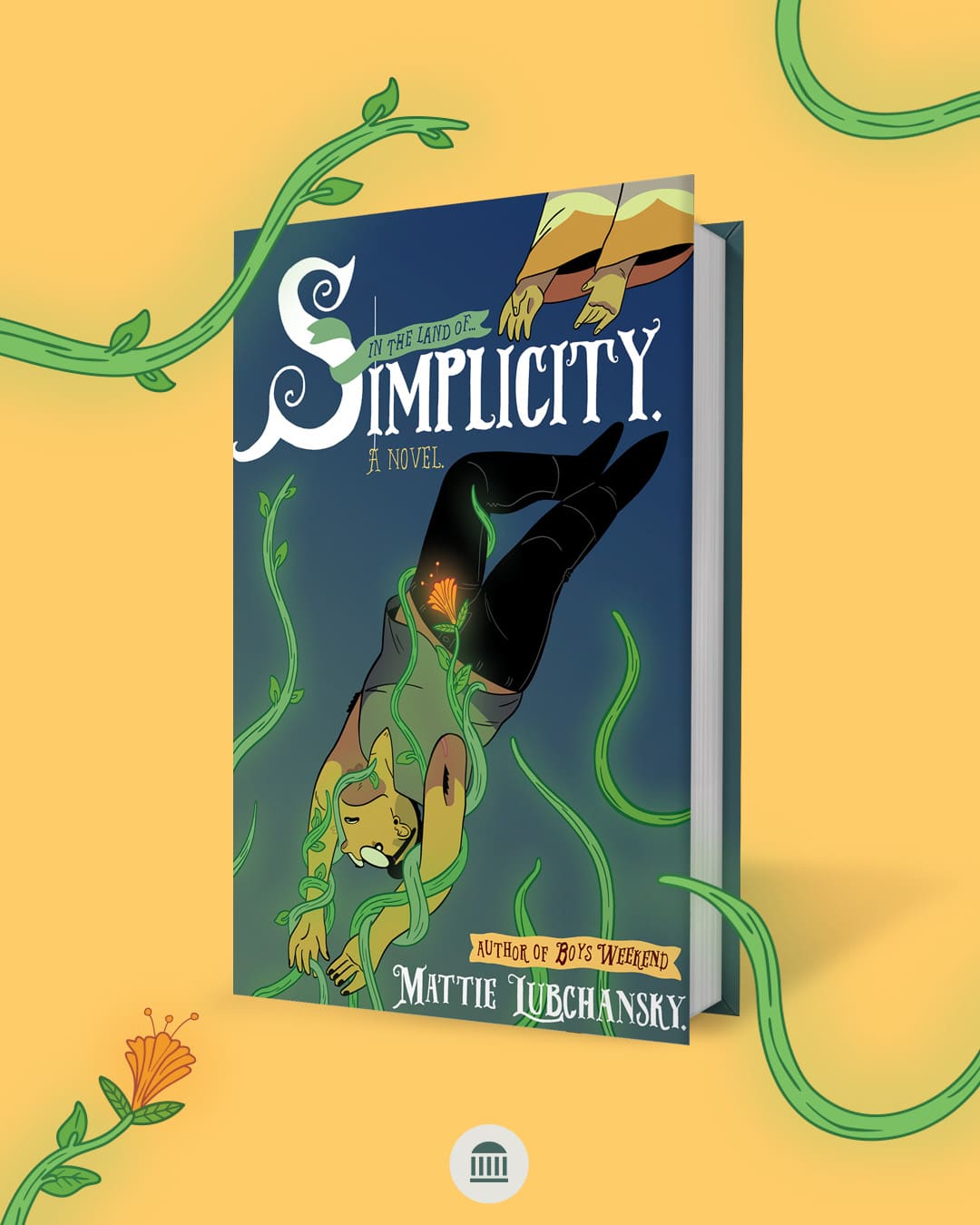
KAPLAN: Why did you choose to tell this story as a comic?
LUBCHANSKY: I mean the short answer is that it’s the best medium for genre fiction storytelling, for my money! But more specifically, “is this a comic” is the sort of thing I end up asking myself a lot when I have an idea, because I’m so used to going straight there –– I credit my time as an editor at The Nib for giving me this sense, because not everything is a comic! But for Simplicity, the story to me is so, so visual. I had this really vivid sense of both how the world looked. When I first started on the project, all I had was Lucius and the visions he has in the book and almost everything else was downstream from that iconography.
KAPLAN: Where did you get the inspiration for the world in Simplicity?
LUBCHANSKY: I relied really heavily on research for this book. I had this idea, for the way the mainstream society in the world of the book functions, which was just me firing up the speculative fiction machine that’s always whirring in my brain trying to draw a straight line from where we’re at now. But I had no conception of what life in the titular settlement should or could be like. A friend told me to get a copy of Paradise Now, which is a nonfiction book about 19th century pre-Marxist “communitarian” settlements in America, and it really fascinated me and I kind of re-oriented a lot of how the “cult,” called the Spiritual Association of Peers, in the book, functioned.
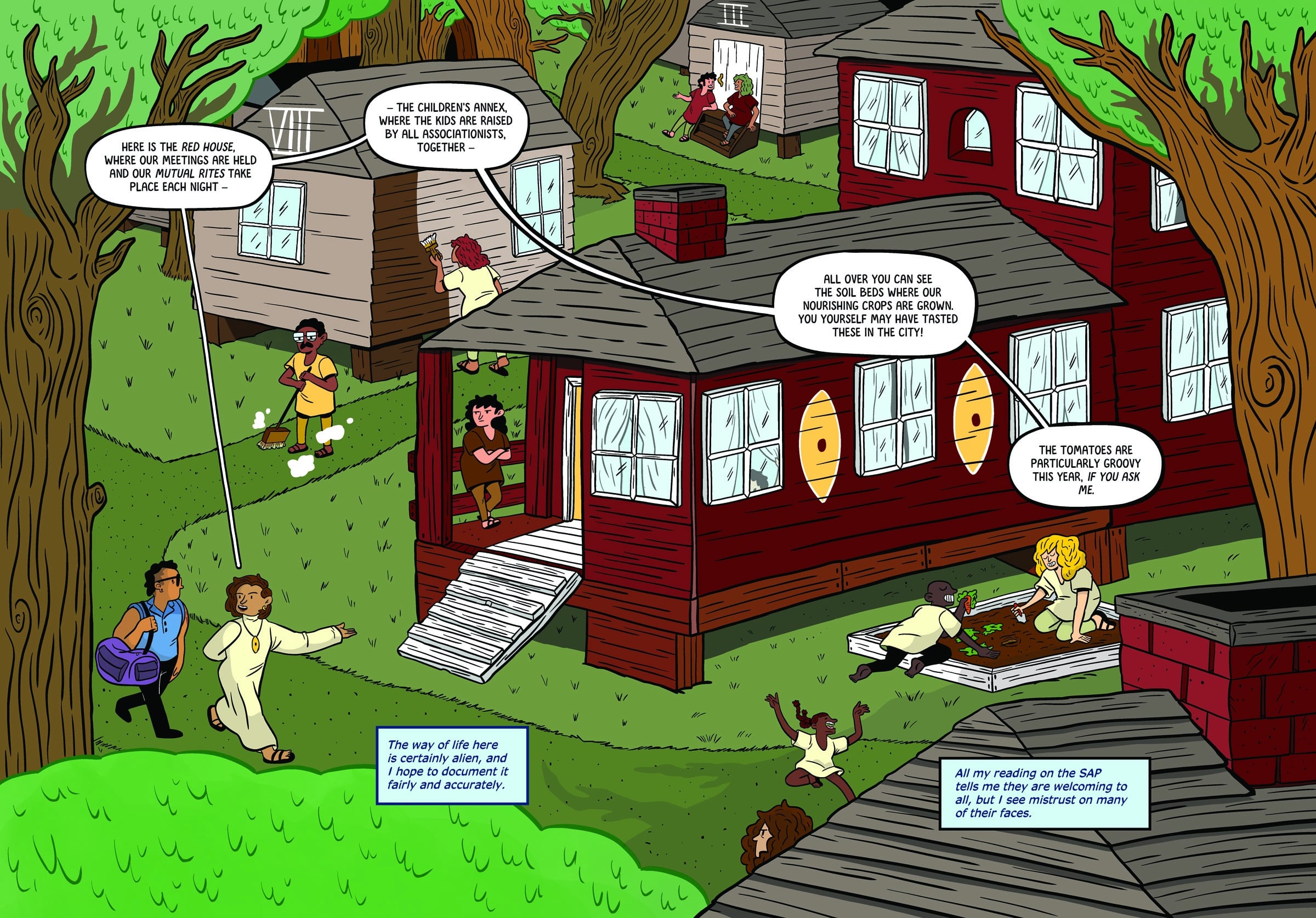
KAPLAN: What draws you to making stories about cults?
LUBCHANSKY: I think I’m less interested in “cults” specifically, and more about how communities function (or don’t), and how ideas and thoughts take root in certain times and places. The cults in Boys Weekend and Simplicity are vastly different, I honestly tried not to think about the SAP in this book as cult necessarily…they have a much more thought-out conception of the world and a purpose and drive. The Grey Hand in Boys Weekend was (on purpose) very vague and impenetrable and based around a very out-of-the-box “eldritch” belief system, I wanted the reader to feel what Sammie was feeling about it right out of the gate. Lucius in Simplicity, on the other hand, he’s like oh, these guys have some good points.
KAPLAN: You previously told Publishers Weekly that “capitalism presents a vision for what a desirable person should be, and those aspirations manifest in a more volatile, violent, depressive version of masculinity, whiteness, straightness, or what have you.” What you said made me think of how gender is and is not policed in the different communities in Simplicity (at one point, Lucius notes what his body costs him compared to the SAP members). How do you think capitalism impacts queer bodies?
LUBCHANSKY: Yeah, I think I still agree with myself there! It’s also easy to start wondering if your wants have been sold to you…But I think our desires are still to be taken seriously. I’d say the biggest impact, though, is materially. Transition is prohibitively expensive – even if you manage to get a lot of care covered by insurance, there are still all sorts of surgery recoveries to take into consideration, such as time off work that a lot of us can’t afford. PrEP without insurance is prohibitively expensive. Capitalism necessitates its underclasses, and queer people are just one of them. Being poor is horrible for your body.
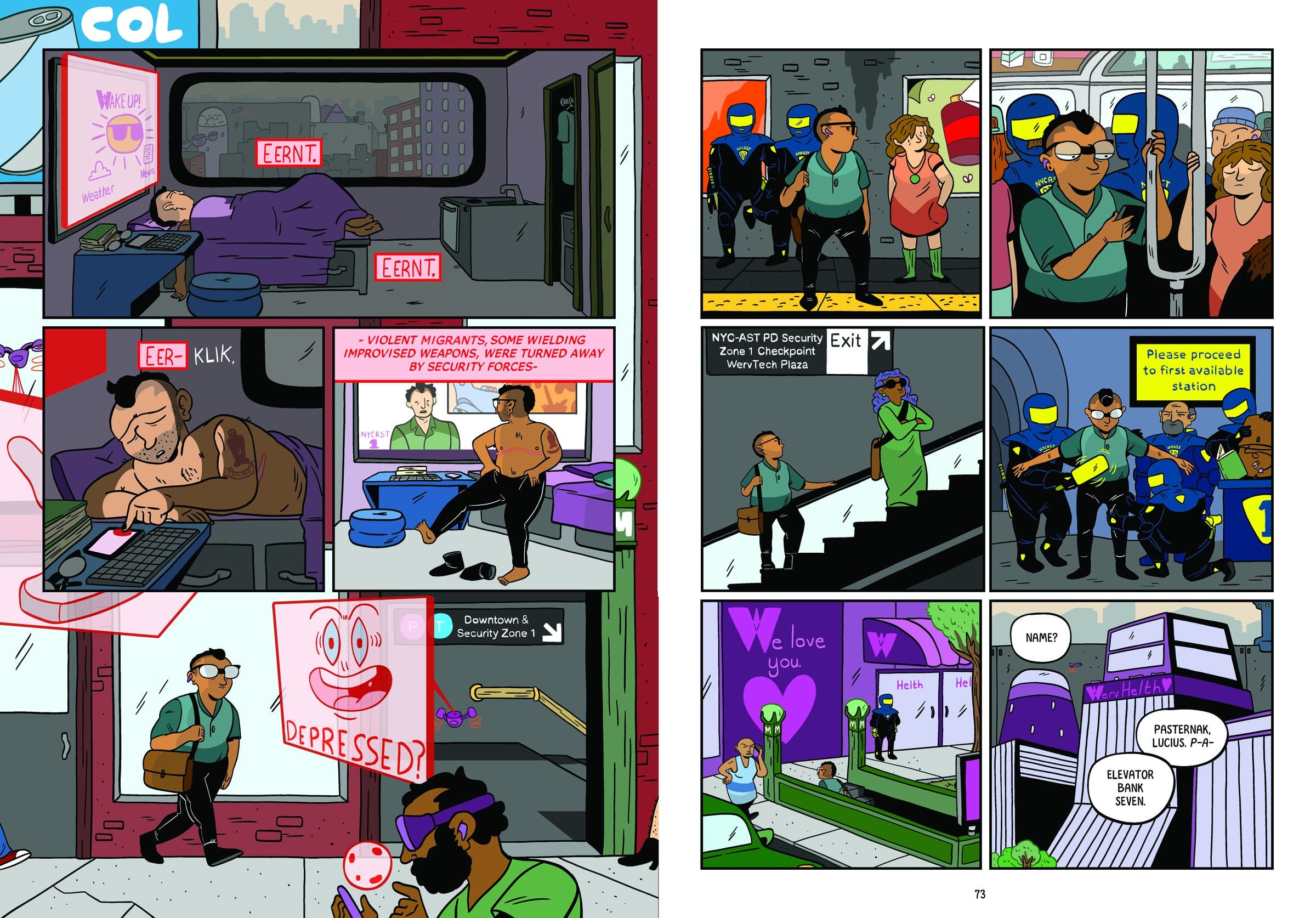
KAPLAN: With this administration’s attempts to erase trans people from public life, what impact do you hope Simplicity will have?
LUBCHANSKY: I don’t have any illusions about some Republican or TERF maniac picking up this book and having their mind blown or anything. That said, I still think it’s really important that trans people get to make culture. We should be in the library, in the bookstore, in your house. I feel tremendously privileged that I got to live there, and I take it seriously. I obviously hope cis people read it, but I want to make trans culture, for trans people. The other important thing here to me is that the book has a lot in it about sex and sexual desire. Trans sexuality has been demonized to an outlandish degree. But I don’t think we need to do anything to make ourselves palatable anymore. They’re going to call us perverts, no matter how small we make ourselves. There’s no reason to play that game anymore.
KAPLAN: You’ve previously stated that your work will always be political. What role do comics play in political resistance?
LUBCHANSKY: I know there are a lot of people who make really political work that think they’re out there changing hearts and minds but I’m a little more jaded on that front. I don’t think anyone can have their mind changed by a book, not really. But the thing I’m sort of a corny optimist about is, people do change their minds, they just do it on their own terms really. This is how organizing works, too. You can be one little pebble rolling down a hillside, and then suddenly someone who listened to you experiences an avalanche.

KAPLAN: You’re well-known for your work at The Nib and other short-form comics. How does the artistic process of creating short-form comics compare to long-form ones?
LUBCHANSKY: It’s a completely different skill I’ve had to learn over the last few projects. The big thing I’ve had to teach myself is patience. I work pretty fast, but I’m still only getting 4 or 5 pages done every week. So you have to be really, really committed to seeing it through, and not getting the immediate dopamine hit of a public reaction to the work – I finished Simplicity over a year ago and I just got to hold it in my hands today(!) for the first time. So you’ve really caught me, while it feels worth it in the extreme.
KAPLAN: Is there anything else you would like to add?
LUBCHANSKY: I just really hope this weird, horny, knotty book finds its audience. I’m so immensely proud of it. And that people should know it’s horny.
(Featured Image: Pantheon/Sylvie Rosokoff)
Pre-order Mattie Lubchansky’s newest graphic novel, Simplicity, today!



